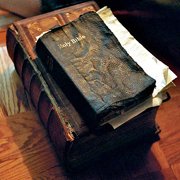
| Back To Meditation Home Page |

Custom Search
|
Are we Living in the Last Days...End Times? See Breaking News |
 |
| __________________________ |
 |
_________________________ |
| __________________________ |
As You Study the Biblical Last Days in the News... Discover the Bible As Well |
 |
| __________________________ |
 |
| __________________________ |
 |
| __________________________ |
To Know God's Word Read Scripture |
 |
_________________________ |
To Read God's Word Your Reading Schedule |
 |
_________________________ |
 |
| __________________________ |
Thought Provoking Articles for Your Meditation |
 |
_________________________ |
|
Jephthah's Bizarre Vow |
|---|
In the Book of Judges chapter 11, an account is given of a daring, intrepid man, a skilled warrior, and one who was quick to avenge injuries and ready to defend the helpless as well as forgive the wrong. This man Jephthah, was the son of a harlot, but began his life living in his father's house. His father and his father's wife had other sons born to them. Over the course of years these other legitimate sons decided Jephthah should not inherit anything from their parents. His lineage was not pure like theirs. So Jephthah was cast out on his own. He took up residence at Tob, a district of Syria not to far from where he grew up at Gilead. Here he became head of a marauding party, and when war broke between the Israelites and the Ammonites he became a natural choice to lead the Israelites in war. Jephthah did not immediately go to war but waited until negotiations with the king of the Ammonites broke down, thus indicating he was not a rash or impetuous. but he made a vow to God that seemed hasty and reckless. On the eve of the battle Jephthah vowed to God that if he were victorious in battle, he would give to God whoever came through the doors of his house upon his return from war. This turned out to be his daughter, an only child, who welcomed his return with music and dancing. |
 |
Did Jephthah intend to offer his daughter as a human sacrifice? Are the ethics of God and the Bible shown to be imperfect by this incident? Should Jephthah have even made a vow at all? If Jephthah intended to offer a human sacrifice, he would be doing something that was explicitly forbidden by Mosaic Law and that is revolting to GOD.
It would be a bit bizarre for Jephthah to think that he could elicit God's favor in battle with the heathen Ammonites, by promising to offer Him a human sacrifice. This would be something the ungodly he was fighting would do and would also be in direct violation of the will of God. God certainly would not approve of such an offer or vow. God allows people to make wrong choices, even while He works out His own higher will in the midst of their illicit deeds. There are many examples in scripture. GOD does and always has, since the fall in Eden, given us our choice. He loves us enough to let us choose.right or wrong.good consequences or bad.So Jephthah made his choice.and his vow to the LORD. If Jephthah offered his daughter as a human sacrifice, no indication is given in scripture that God actually approved of the action. The Bible records many illicit actions carried out by numerous individuals throughout history, without an accompanying word of condemnation by the inspired writer. It must not be assumed that silence is evidence of divine approval. Even the commendation of Jephthah's faith in the New Testament (see Hebrews 11) does not offer a blanket endorsement to everything Jephthah did during his lifetime. It merely commended the faith that he demonstrated when he risked going to war. Similarly, the Bible commends the faith of Samson, and Rahab the prostitute, without implying that their behavior was always in harmony with God's will. Abraham manifested an incredible level of faith on several occasions, and is commended for such. Yet he clearly sinned on more than one occasion. Jephthah's action may best be understood by recognizing that he was using the term "burnt offering" in a figurative sense. We use the term "sacrifice" in a similar fashion when we say, "I'll sacrifice a few dollars for this or for that." Jephthah may have been offering to sacrifice a member of his extended household to permanent, religious service associated with the Tabernacle. The Bible indicates that such non-priestly service was available, particularly to women who chose to so dedicate themselves.
Even in the first century, Anna must have been one woman who had dedicated herself to the Lord's service, since she "did not depart from the temple" . she lived many years there, finally in her old age, she beheld her savior, Jesus!
Did Jephthah offer his daughter in a figurative sense in service to the LORD or did he actually offer her as a burnt offering to the LORD? This question has been debated for centuries. One thing is certain, Jephthah was devastated by the situation and the vow he had made to the LORD. Imagine the conversations Jephthah had with his daughter and the pain in his soul. |
 |
Four associated facts support the conclusion that Jephthah dedicated his daughter to the LORD's service and did not kill her as a sacrifice to the LORD. First, scripture affirms that Jephthah had no other children. She was his only child (see Judges 11:34). For his daughter to be consigned to perpetual celibacy meant the extinction of Jephthah's family line. His pedigree may have been an extremely important to him, considering the occupation of his natural mother and his treatment by his siblings. Family heritage was an extremely serious matter to any Israelite, but it may have been especially important to the son of a harlot. Second Jepthath's daughter lamented her virginity not her death (see Judges 11:37). Third, the two-month period of mourning that Jephthah granted to his daughter (see Judges 11:38), with her companions, was not for the purpose of grieving over her impending loss of life, but over the fact that she would never be able to marry. |
 |
Fourth, the sacrifice is treated as unfortunate.again, not because of any concern over her death, but because she would not become a mother. After stating that Jephthah "did with her according to his vow which he had vowed," the inspired writer immediately adds, "and knew no man" (see Judges 11:39). This statement would be a completely superfluous and callous remark if she had been put to death. Finally, the declaration of Jephthah's own sorrow (see Judges 11:35) follows immediately after we are informed that he had no other children. Jephthah was not upset because his daughter would die a virgin. He was upset because she would live and remain a virgin, without children. He would have no grandchildren... no ancestors! Hannah made a similar sacrifice when she turned her son, Samuel, over to the priestly direction of Eli for the rest of his life (see 1 Samuel 1:11). How many are willing to make such sacrifices? Jephthah made a vow to the LORD .and kept the vow. He kept his word even though it cost him dearly. He was true to his vow and to his LORD.
Actually, however, these acts of devotion were no greater than that which God requires of all Christians: to offer ourselves as living sacrifices in service to God.
The word present is a sacrificial term. It is used in Ephesians 5:27 and Colossians 1:28 where the church is to be presented to Christ in a clean, wholesome, spiritually healthy way. The Apostle Paul is not talking about sacrificing animals. He says we must sacrifice SELF . As living sacrifices, we must be dead to sin (see Romans 6:2), but at the same time we are alive to Christ (see Romans 6:8). A true transformation takes place when we stop living for ourselves and start living for Christ. Without Christ's help this is impossible. We were in sin, lost, alienated from the Lord (see Ephesians 2:1-3). The only power sufficient to bring us forth from spiritual death is the power of God (see Ephesians1:18-23). That power is available for all who will come to the Christ. As peculiar as Jephthah's circumstances were, his bizarre vow is an example of keeping your word when you really don't want to. By always keeping your word, it sometimes ends up costing you dearly. Jephthah's personal pain and feelings, though real and compelling, did not keep him from following his LORD and keeping his vow.
Following Jesus can cost dearly as well. Denial of self and "Taking up your cross" on a daily basis is not easy! Following Jesus can be every bit as difficult to do as Jephthah honoring his vow centuries ago. |
 |
This is a message that is seldom taught in today's churches. It is a message that many may have problems receiving. It is a message of total surrender to God. It is a message of obeying God and walking by faith. It is a message of presenting yourself to God as a living sacrifice. It is a message of saying to God, "Lord, I am bought for a price. I am Your purchased possession. You redeemed me. I am Yours. Use me. Do with me as You wish. I am totally and completely Yours. All I am, and all I have belongs to You. I will no longer walk by sight but will walk by total faith and trust in You for all things, no matter how difficult things appear to get. I am ready to do what You want. I am ready to go where You say. I am nothing of myself. My trust is totally in You, Lord Jesus." Jephthah did it so can you! Be blessed and meditate or meditate and be blessed!!!!.. The choice is yours!! |
 |
Acknowledgments: Amazing Bible Studies, http://amazingbiblestudies.com Apologetics Press, http://www.aploogeticspress.org Ungers Bible dictionary, Moody Press, 1964 eleventh printing |